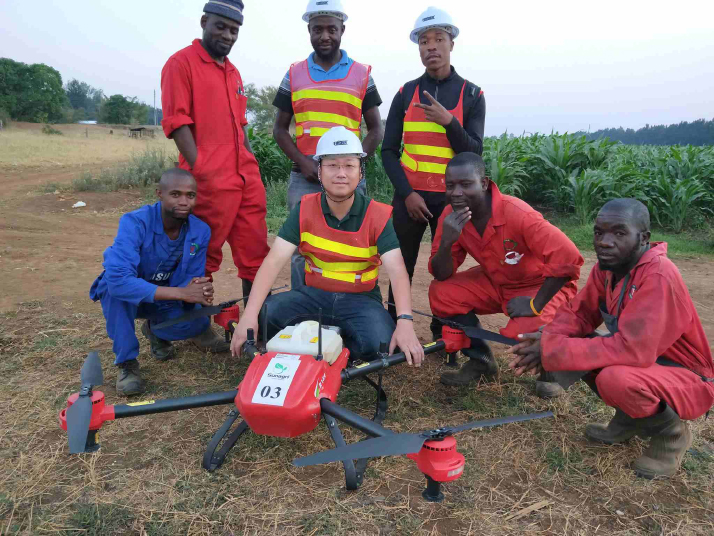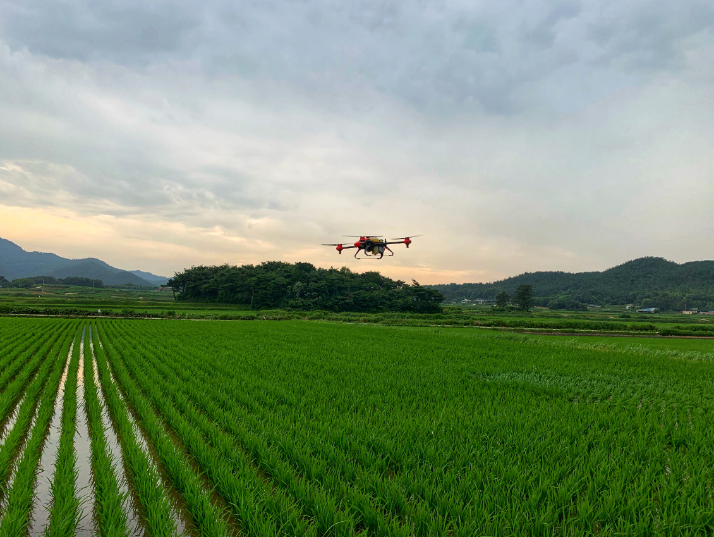|
||||||||||
| Home Nation World Business Opinion Lifestyle ChinAfrica Multimedia Columnists Documents Special Reports |
|
||||||||||
| Home Nation World Business Opinion Lifestyle ChinAfrica Multimedia Columnists Documents Special Reports |
| ChinAfrica |
| Technology empowers Zambian farmers and woos young people into the agricultural field |
| A Chinese company, Sunagri Investment has invested in farming equipment that promotes the use of smart agriculture to help Zambian farmers |
| By Derrick Silimina | VOL.12 May ·2020-05-22 |

It's the end of the rainy season in Zambia, but it's not been good for farmers due to the effects of climate change.
During the 2019/20 agricultural season, many farmers' fields were severely ravaged by an invasive pest commonly known as fall armyworms, posing a threat to Zambia's food security.
As Zambia's staple food, maize is the most cultivated crop and a staple on most households' menus in the Southern African country where 90 percent of the country's daily food intake is through a meal widely known as nshima.
During the 2018/19 farming season, a total of 59,993 hectares of land, supporting over 70,000 households, was affected by the outbreak of the armyworms. This has resulted in 46 districts and 521 agriculture camps sending out distress calls, according to the Ministry of Agriculture.
The voracious caterpillars also attack other grains such as soyabeans and wheat and have since spread to more than 40 countries in Africa, according to the Food and Agricultural Organization.
But for Leonard Sakala, 34, a small-scale farmer based in Mazabuka District in south Zambia, all is not lost. He has been getting help from new technology courtesy of a Chinese company, Sunagri Investment, which has invested in farming equipment that promotes the use of smart agriculture through innovative tools such as drones in order to combat armyworms.
Efficient fumigation option
Sunagri's use of drone technology bypasses labor-intensive manual spraying of maize fields in favor of intelligent automatic spraying.
"Using drone technology has helped me a lot," said Sakala. "While my profits haven't gone up dramatically, technology is helping me reduce my losses that I would have incurred if the pests had ravaged my crops."
With more than 50 hectares of land, Sakala's entire family lives off the farm. Like him, most people in Zambia are completely dependent on agriculture for their livelihood.
Meanwhile, Muhammed Patel, owner of Evergreen Farm situated west of Lusaka Province, said drone technology is a game changer for farmers fighting the annual notorious pests and offers an efficient fumigation option.
"I benefited well from the drone spray service from Sunagri. It fights against armyworms and the equipment is efficient. I have used the drone a couple of times in my soya and wheat crops and the results have been impressive and cost effective," said Patel. He said he recommends drone spraying to all small farmers who rely more on expensive manual labor to spray their fields.
In Zambia, China is not only involved in infrastructure development, but is also investing in other viable economic sectors such as agriculture, which represents the new face of globalization in Africa.
The dawn of technology through modern equipment is key to revolutionizing Zambia's agriculture sector, said Sunagri Investment Zambia Director Frazer Zhang.
"In 2016, I saw how many farmers here wept due to an outbreak of armyworms. I then had an idea and thought about how I could find the right drones that can help combat the armyworm outbreak in Zambia," Zhang told ChinAfrica. "In 2017, I managed to import three manual agricultural drones from China and subsequently brought in smart drones that are able to spray insecticides even at night."
Zhang stressed that Sunagri's XAG (Xaircraft) drone is one of the effective alternatives to decimate notorious pests quickly, because manual spraying during the day is labor-intensive, costly and a waste of chemicals as the worms only come out to feed on the crops at night.
In terms of efficiency, he said that each drone can cover 45 hectares per day and the job can effectively vanquish even the bigger worms that usually hide inside the maize stalk.
However, not every farmer can afford to invest in expensive technology - as the XAG (Xaircraft) drone is costly at between $2,000 and $3,000 each.
To make the drones more accessible, The African Development Bank (AfDB) recently launched a $1-billion initiative called Technologies for African Agricultural Transformation, jointly with the World Bank, the Bill and Melinda Gates Foundation, International Fund for Agricultural Development and other partners, to scale up available agricultural technologies across agro-ecological zones on the continent.
The AfDB is also providing $20 million to tackle the challenge of the armyworms. This support will allow at least 15 million farmers in six countries in Southern Africa to combat the armyworms using control technologies.

Getting youth into farming
Due to the high cost of production in the sector, farming has an unglamorous image in Zambia, especially among the youth. But this perception is gradually changing.
Most young people portray agriculture as a sector meant for retirees, or for elderly people who are poverty stricken.
"We must invest in the youth of Africa. They are not only the future, but also the present of Africa. I do not believe the future of Africa's youth lies in migrating to Europe. The youth's future lies in an Africa with more rapid and inclusive economic growth, which creates quality jobs," AfDB President Akinwumi Adesina said recently.
Climate change is worsening the farming environment, especially in Sub-Saharan Africa, where it's been estimated by the International Food Policy Research Institute (IFPRI) that the continent will add an additional 38 million hungry people by 2050 due to climate change.
With the rapid growth of the use of drones, automated tractors, artificial intelligence and robotics, among others, agriculture is poised to see a boost in productivity.
It is estimated by the IFPRI that the size of the food and agribusiness market in Africa will be worth a whopping $1 trillion by 2030.
It is more likely that the future farmers will be sitting in their homes with computer applications using drones to determine the size of their farms, monitor and guide the applications of farm inputs, and driverless combine harvesters bringing in the harvests.
It is for this reason that Zhang emphasized it is his passion to help inspire young people in Zambia to appreciate the value of smart agriculture in their lives, through harnessing technological tools.
"My dream is to influence Zambia's young people [and bring them] back to agriculture. I want to help Zambia and its youthful generation become a model of smart agriculture in Africa."
Zhang reiterated that apart from providing spraying services via his drones to commercial farmers at $20 per hectare, his company has done a lot to train local small-scale farmers in using high-tech agricultural equipment.
He emphasized that government should invest in technology and come up with a deliberate policy in order to incentivize locals and help them improve their agricultural production. This can be done through smart agriculture, especially in Zambia where the majority of farmers have small holdings.
Through free tutorials and spray demonstrations in local farmers' fields, Zhang stressed that his services have gone a long way in rekindling the hope that young farmers have in the sector.
Zhang added that his company is already working with major agricultural entities such as Chamba Valley Farm, York Farm, Seed Co and Zambia Sugar, among others, in a bid to expand its services in the Southern African Development Community region.
(Print Edition Title: Farming Goes Hi-Tech)
* Reporting from Zambia
* Comments to zanjifang@chinafrica.cn
| About Us | Contact Us | Advertise with Us | Subscribe |
| Copyright Beijing Review All rights reserved 京ICP备08005356号-5 京公网安备110102005860号 |